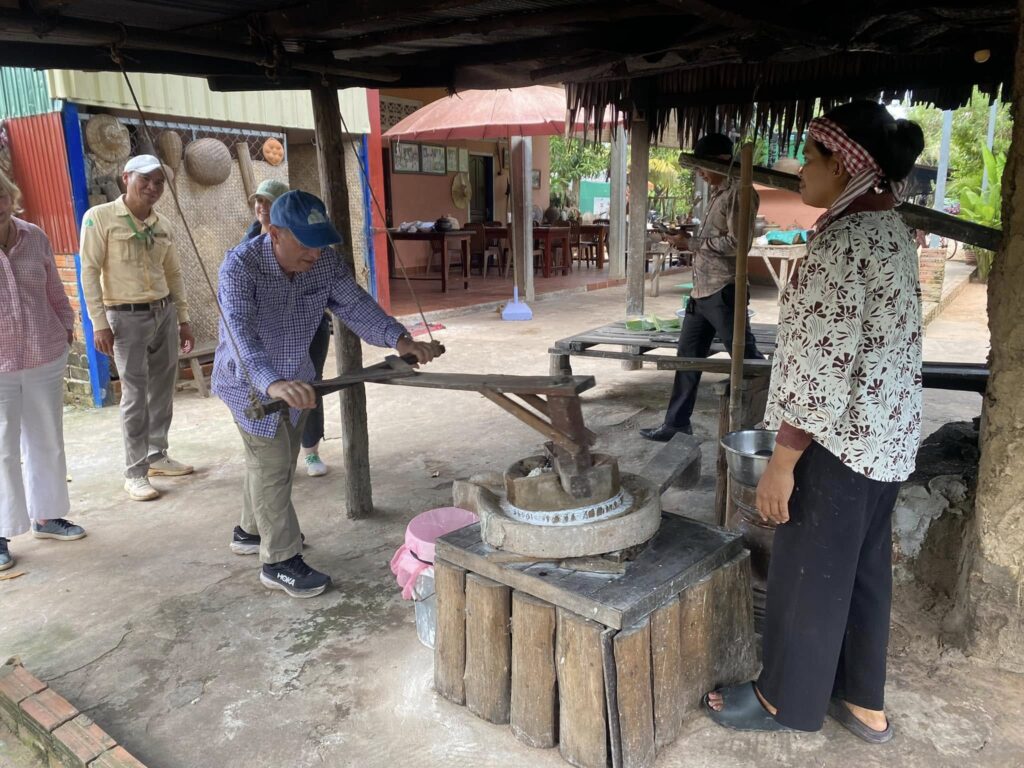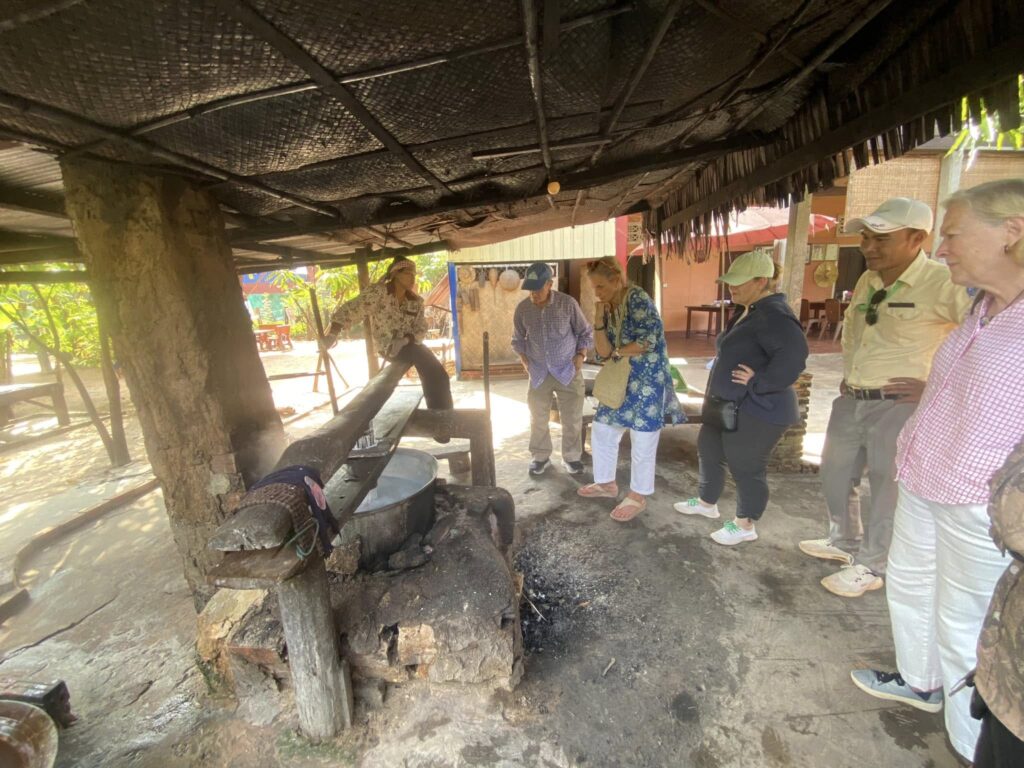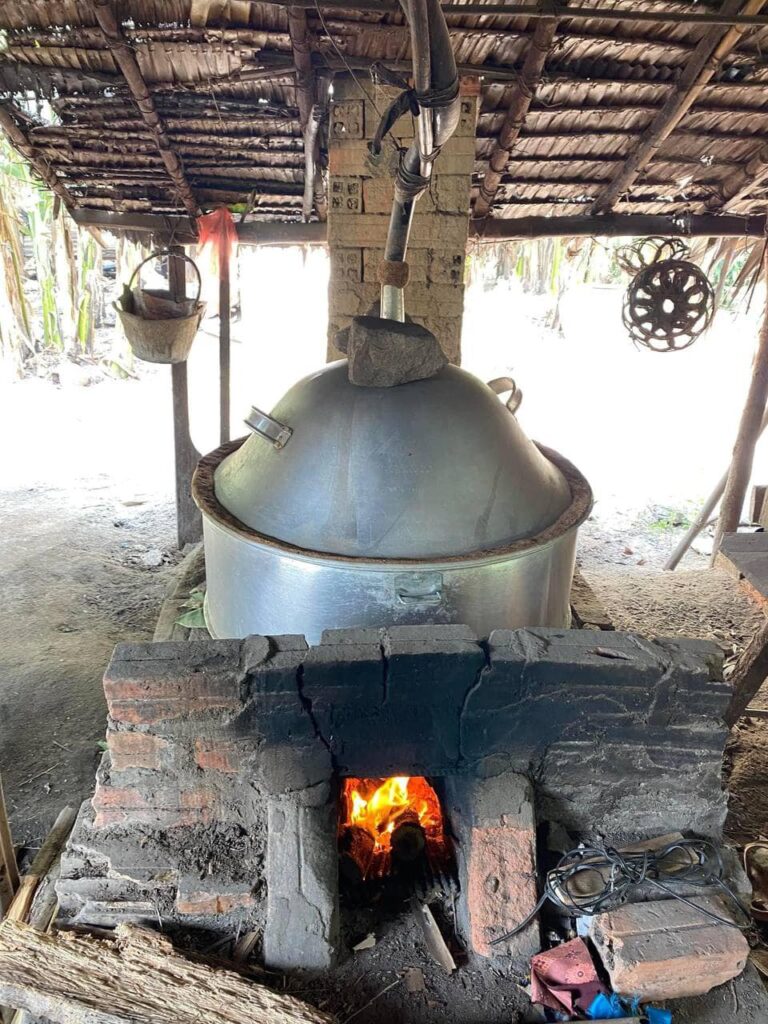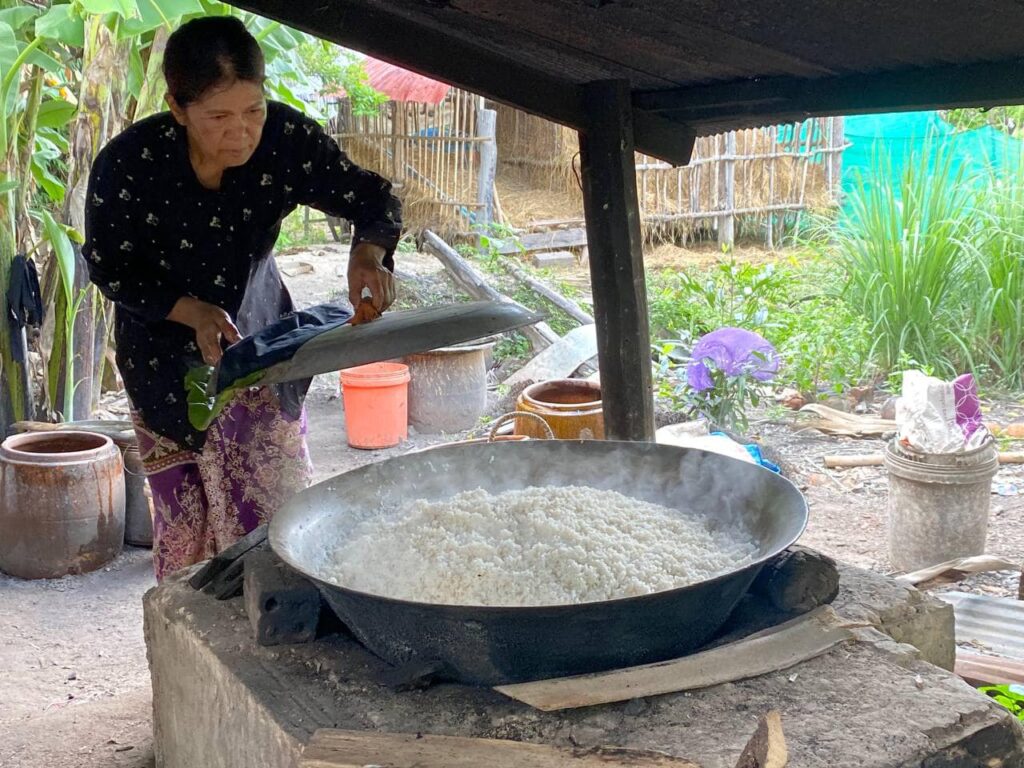– some important points ,
e.g. Preah Dak Community Experience, a great project
- Real Experience
Show the real life of people in the countryside. Let tourists meet local people in their homes and villages, not in places made to look special. - Work with the Community
Work together with local people to plan and run the tours. This helps local families and gives them extra income. You can also support village projects. - Daily Activities
Let tourists join in everyday life. They can visit local markets, help with farming, try making crafts, or eat meals with local families. - Learn About Culture
Help tourists learn about Cambodian culture. They can visit pagodas, watch or join ceremonies, and enjoy traditional music or dancing. - Teach About the Countryside
Tour guides should talk about Cambodian history, farming, and how people live. They should be ready to answer questions. - Be a Good Tourist
Ask tourists to respect nature, local people, and traditions. They should not take or damage anything and should always be polite. - Speak Clearly
Tour guides should speak English or the language of the visitors. Good speaking helps tourists feel happy and understand everything. - Safety and Comfort
Keep tourists safe and comfortable. Give easy instructions, especially for new or unusual activities. - Think About the Future
Make sure the tours do not hurt nature or village life. Try to help the community and protect the culture for the future.
_____________________
Vocabulary:
1. to offer a tour – to give people the chance to go on a trip or visit a place with a guide.
2. countryside – land outside the city with farms, fields, and small villages.
3. an experience – something you do or see that helps you learn or remember.
4. local people – the people who live in a place.
5. a village – a small group of houses where people live, smaller than a town.
6. a community – a group of people living in the same place or area.
7. to run a tour – to plan and guide a trip for visitors.
8. an income – money you get from working or selling something.
9. to support – to help someone or something.
10. an activity – something people do for fun or learning.
11. to join – to take part in something.
12. farming – working with animals or plants to get food.
13. to make crafts – to create things with your hands, like baskets or clothes.
14. a meal – food you eat at one time (for example, lunch or dinner).
15. to watch a ceremony – to look at a special event like a wedding or religious activity.
16. to answer a question – to say something when someone asks you something.
17. to respect nature – to care for the earth, animals, and plants.
18. to damage – to break or hurt something.
19. to be polite – to be nice and show good manners.
20. to feel happy – to have a good feeling or be glad.
21. safety – being free from danger or harm.
22. comfort – feeling good, warm, or relaxed.
23. easy instructions – simple steps that are not hard to follow.
24. to hurt somebody – to cause pain or injury to someone.
25. to protect something – to keep something safe from harm.

################
Multiple-choice test, one answer correct
1. What does to offer a tour mean?
a) To give people the chance to go on a trip with a guide
b) To buy food for a visitor
c) To take care of a hotel room
2. What is the countryside?
a) A place with many big shops
b) A busy street in a city
c) A quiet place with farms and small villages
3. What is an experience?
a) A food you eat once
b) A thing you buy at the market
c) Something you do and learn from
4. Who are local people?
a) People who come from other countries
b) People who live in the area
c) People who teach in schools
5. What is a village?
a) A large town with many buses
b) A place with many tall buildings
c) A small group of homes in the countryside
6. What does a community mean?
a) A group of people living in the same area
b) A meal eaten in a restaurant
c) A sport you play with friends
7. What does it mean to run a tour?
a) To sleep during the day
b) To organize and lead a visit for people
c) To write about a place
8. What is an income?
a) A letter from a friend
b) A gift from a tourist
c) Money earned from work
9. What does to support mean?
a) To help someone or a group
b) To clean a house
c) To sell drinks to visitors
10. What is an activity?
a) Something you do like making or learning
b) A shop where people buy clothes
c) A car for driving tourists
11. What does to join mean?
a) To leave early
b) To become part of a group or activity
c) To sit and wait
12. What is farming?
a) Working with animals and crops
b) Eating food with a family
c) Drawing pictures of trees
13. What does to make crafts mean?
a) To talk to a group of people
b) To build houses with machines
c) To create things with your hands
14. What is a meal?
a) A plan for traveling
b) Food you eat at one time
c) A tool for farming
15. What does to watch a ceremony mean?
a) To look at a special event
b) To cook a traditional food
c) To clean a village
16. What does to answer a question mean?
a) To say something after someone asks
b) To sit in a group
c) To wait for a guide
17. What does to respect nature mean?
a) To throw trash on the ground
b) To keep the environment clean
c) To take photos of animals
18. What does to damage mean?
a) To break or hurt something
b) To fix something
c) To share something
19. What does to be polite mean?
a) To speak nicely and show good manners
b) To walk slowly in the sun
c) To run through a village
20. What does to feel happy mean?
a) To cry a lot
b) To feel tired after walking
c) To enjoy and smile
21. What is safety?
a) A way to make friends
b) Being away from danger
c) Having a job
22. What is comfort?
a) Feeling good and relaxed
b) Getting ready to travel
c) Playing a game with others
23. What are easy instructions?
a) Steps that are simple to follow
b) Questions about a place
c) A short story about a person
24. What does to hurt somebody mean?
a) To make someone feel better
b) To cause pain
c) To give someone a tour
25. What does to protect something mean?
a) To break it by mistake
b) To give it away
c) To keep it safe
____________________
1a 2c 3c 4b 5c 6a 7b 8c 9a 10a 11b
12a 13c 14b 15a 16a 17b 18a 19a
20c 21b 22a 23a 24b 25c
###################

Gap-fill exercise, one answer correct only
- The group leader was proud to __________ the village tour.
a) run
b) join
c) answer - The villagers cook a meal and __________ it with guests.
a) join
b) run
c) share - Visitors can __________ a traditional ceremony if they want.
a) feel
b) watch
c) protect - The local people like to __________ crafts to sell at the market.
a) comfort
b) run
c) make - The guide gave clear and __________ instructions.
a) hurt
b) easy
c) damage - The guide answered every __________ from the tourists.
a) join
b) activity
c) question - You must never __________ anyone during the tour.
a) answer
b) hurt
c) join - Visitors should __________ nature and local animals.
a) protect
b) hurt
c) support - The villagers earn an __________ from the tours.
a) income
b) experience
c) comfort - Tour guides need to __________ local customs carefully.
a) answer
b) respect
c) join - The village is a small __________ where many families live.
a) community
b) countryside
c) village - The children joined a fun __________ with the farmers.
a) village
b) meal
c) activity - The family offered us a delicious home-cooked __________.
a) answer
b) income
c) meal - The goal is to __________ nature and not cause harm.
a) protect
b) watch
c) damage - The guide showed how to __________ baskets made of bamboo.
a) protect
b) run
c) make - The guide is responsible for the visitors’ __________ and comfort.
a) farming
b) damage
c) safety - Tourists feel __________ after spending time with villagers.
a) hurt
b) happy
c) watch - The village __________ helps everyone to work together.
a) community
b) experience
c) farming - The children enjoyed the farming __________ very much.
a) income
b) meal
c) activity - The guide gave __________ instructions before starting the activity.
a) farming
b) easy
c) protect - We want to __________ tours that show real village life.
a) respect
b) offer
c) hurt - The tour helps the local __________ by giving money and work.
a) farming
b) answer
c) community - The village is in the quiet __________ of Cambodia.
a) countryside
b) answer
c) community - You can __________ a farm activity like planting rice.
a) join
b) protect
c) support - Please be __________ when you visit local families.
a) feel
b) answer
c) polite
_____________________________
1 a, 2 c, 3 b, 4 c, 5 b, 6 c, 7 b, 8 a, 9 a,
10 b, 11 a, 12 c, 13 c, 14 a, 15 c, 16 c, 17 b, 18 a,
19 c, 20 b, 21 b, 22 c, 23 a, 24 a, 25 c
###############
True or false statements:
- The tours help local communities earn income.
- Tour guides should avoid answering tourists’ questions.
- Visitors can watch traditional ceremonies during the tours.
- It is important to protect nature and not cause damage.
- Tourists should be polite when visiting local families.
- The village tours show fake and staged scenarios.
- Tour guides do not need to speak English.
- Comfort and safety are important for tourists on the tours.
- The tours do not help the local economy.
- Visitors can join farming activities in the countryside.
- Tour guides should give easy instructions for activities.
- Tourists should disrespect local customs to learn more.
- The tours allow tourists to learn about Cambodian culture.
- Visitors should try to hurt animals to protect them.
- The tours are planned with the help of the local community
_________________________
True: 1,3,4,5,8,10,11,13,15
#######################

Match the word to its definition:
Words:
- Community
- Activity
- Income
- Polite
- Comfort
- Experience
- Village
- Protect
- Safety
- Respect
- Farming
- Tradition
- Guide
- Ceremony
- Craft
- Support
- Nature
- Instruction#
Definitions:
a) A small group of houses in the countryside
b) To keep someone or something safe from harm
c) The natural world, including plants and animals
d) A task or event that people do for fun or learning
e) Showing good manners toward others
f) Help or assistance given to someone or something
g) Money earned from work or business
h) A person who helps others understand or do something
i) Rules or directions given to explain how to do something
j) The way of life or customs passed down from older generations
k) A special event or celebration with rituals
l) A handmade object made with skill
m) The feeling of being relaxed and free from pain
n) The act of growing crops and raising animals for food
o) The act of honoring or valuing someone or something
p) The feeling or knowledge gained from doing something
q) Being free from danger or harm
r) A group of people living in the same area
_______________________
Answers:
1 r, 2 d, 3 g, 4 e, 5 m, 6 p, 7 a, 8 b, 9 q, 10 o,
11 n, 12 j, 13 h, 14 k, 15 l, 16 f, 17 c, 18 i#
#################
Fill in, words below:
- The tour shows the life of __________ people.
- Visitors join activities in the __________
- Tour __________ answer questions in English.
- People make crafts in the __________.
- Tourists watch a ceremony in the __________.
- The __________ supports the local community.
- Visitors __________ a meal with local families.
- It is important to respect __________
- Safety and comfort are __________ on tours.
- The __________ helps to run the tour.
- Visitors __________ about farming and crafts.
- Tourists must be __________ and kind.
________________
community – guides – eat – local – polite – pagoda – village – nature.- learn – important – tour – countryside
________________
- local
2. village
3. guides
4. countryside
5. pagoda
6. tour
7. eat
8. nature.
9. important
10. community
11. learn
12. polite
##################

You talk to Thorn Bun Thoeng, who offers the Preah Dak Village Experience tour; he has got lots of useful information on that topic – complete, words below:
- What is the tour about?
- It shows local people and their life in the __________.
- Who do you work with?
- We work with the village __________ and local families.
- What activities do tourists do?
- Tourists join farming, make __________, and visit markets.
- Can tourists eat local food?
- Yes, tourists eat meals with local __________.
- Why is respect important?
- Respect keeps traditions safe and makes __________ happy.
- Do guides speak English?
- Yes, guides speak English to _________ tourists understand.
- How do you keep tourists safe?
- We give clear __________ and watch activities carefully.
- What should tourists not do?
- Tourists should not hurt people, animals, or __________
- Are tours fake [not real or not true]or real?
- Tours are real, not __________ or staged.
- How does the village benefit [something good that you get from something]?
- The village earns __________ and support from tours.
- Can tourists watch ceremonies?
- Yes, tourists watch local ceremonies like in _________.
- What is comfort on a tour?
- Comfort means feeling __________ and relaxed during the tour.
- Who answers questions?
- The tour guide __________ questions from tourists.
- Why is language important?
- Language helps tourists __________ and enjoy the tour.
- What is responsible tourism?
- It means __________ the village and respecting local customs.
________________
understand – money – village – answers – help – pagodas – families – fake – helping – people – safe – nature. – crafts – instructions
________________
- village
2. community
3. crafts
4. families
5. people
6. help
7. instructions
8. nature.
9. fake
10. money
11. pagodas
12. safe
13. answers
14. understand
15. helping
###############
A tour-guide:
I start the tour by going to the local market. I see fresh fruits and vegetables there. Then, I visit a farm where I help with farming activities like planting or picking crops. After that, I go to a family home and eat a home-cooked meal with them. I watch a traditional ceremony at the village pagoda. I listen to stories about local customs and ask questions when I want. I feel safe and comfortable during the tour. This tour shows real village life and how local people live.
Rewrite the story, starting with
He starts the tour by going to….
and make all chages necessary!
________________
Correct version:
He starts the tour by going to the local market. He sees fresh fruits and vegetables there. Then, he visits a farm where he helps with farming activities like planting or picking crops. After that, he goes to a family home and eats a home-cooked meal with them. He watches a traditional ceremony at the village pagoda. He listens to stories about local customs and asks questions when he wants. He feels safe and comfortable during the tour. This tour shows real village life and how local people live.